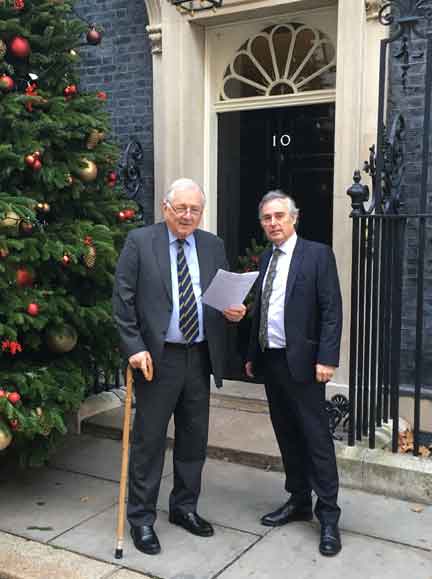
This is the first of 3 articles looking at the history of the RTA project and the findings of the most recent consultation.
The stated objective of Ministers since 2014 is to make it easier to form a formal residents group known as a Recognised Tenants Association (RTA).
LKP has argued from the outset that there were many problems faced by leaseholders trying to organise themselves to represent their joint interests, and that more needed to be done to help them. It was also clear that many landlords have a range of tactics to stop RTAs from being formed, despite their repeated assurances to officials that they were keen to work with residents groups.
The History
RTAs are defined under s29 of the 1985 Landlord and Tenant Act:
https://www.legislation.gov.uk/ukpga/1985/70/section/29
The problem has always been that government had never brought forward any practical guidance on how s29 should be applied. Until now the Tribunal had been left to rule on s29 matters using a piece of procedural guidance written by the Welsh Office in 1980, a time and a place were the world of leasehold was very different.
2011 – LKP first met officials to talk about RTAs. At that point officials felt that no action was needed to change the RTA rules, and that if there were very few officially recognised tenants groups that was simply because most leaseholders were perfectly happy and didn’t need such groups.
It was never going to be easy to explain to a leaseholder, who may live on the other side of the world where leasehold doesn’t exist, that the flat they thought they owned is in fact leased, and that they needed to become a member of a tenants group. As far as that leaseholder was concerned he was the landlord and the person renting from him was the tenant.
2012 – LKP worked with a sector-wide group to look at the problems faced by RTAs. In November 2012 we met Housing Minister Mark Prisk and explained that more needed to be done on a series of issues. We argued that more could be done to help bring more leaseholder groups into existence. Officials continued to be far from sure that change was needed. They explained that they had no data to know whether leaseholders were happy or not with existing systems, beyond anecdotal examples.
2013 – LKP helped coordinate a cross-sector group who were working to reach a consensus on what might be done to encourage the formation of more RTAs. The group included the British Property Federation to represent the landlords, the Greater London Authority, Which? and AgeUK. Southwark council represented the interests of social landlords. At the time LEASE chose not to see it as part of their role to be involved in the project, and neither did the main managing agent’s trade body ARMA. The view of ARMA at the time might be summarised as being that the legislation made RTA a matter for landlords and tenants and that agents can only do what their client wants them to do. Any managing agent looking to help residents to organise themselves against the landlord’s wishes is not going to be approved of by the landlord. Since LKP accredits a number of managing agents willing to commit to certain ethical standards we used them to add the agents’ input.
Proposals were submitted in November 2013 by which time the Housing Minister had just changed to Kris Hopkins.
2014 – In August SoS Eric Pickles and new Housing Minister Brandon Lewis announced more should be done to help leaseholders form RTAs.
https://www.gov.uk/government/news/flos-law-new-cap-for-council-house-repairs-comes-into-force
2015 – The Housing Department came forward with a discussion consultation. This document, unfortunately, repeated a number of the Department’s historic misunderstandings on RTA issues and problems faced by leaseholders.
https://www.gov.uk/government/consultations/making-it-easier-for-leaseholders-to-gain-recognition-of-a-tenants-association
No report on the consultation results was published.
By the end of 2015 MPs had become frustrated with the lack of progress. In December 2015 Sir Peter Bottomley introduced a back bench amendment as part of what turned into s130 of the 2016 Housing and Planning Act. Ministers assured Sir Peter that government lawyers would work with him and then with Lord Young to finalise the wording on RTAs to be included in the Act. That did not happen. At the very last minute the government came forward with their own changed wording. Both Sir Peter and Lord Young made it clear to officials that the wording did not agree with what they had intended.
2016 – The Housing and Planning Act came into force in May 2016, but s130 would only come into force when a further Statutory Instrument containing guidance was issued.
In September the Housing Department was finally ready for “pre-consultation” meetings. The full consultation was meant to follow later that year.
LKP and a number of lawyers raised over 20 issues or mistakes in the draft consultation document, and in particular made clear that the Department’s understanding of both human rights law and data protection seemed to be wrong.
No conclusion to the pre-consultation was published.
LKP and the MPs asked officials to speak to the Information Commissioners Office (ICO) to help them understand how best to apply the data protection rules more correctly. No meeting took place.
2017 – Following the pre-consultation, the consultation itself was finally published in July 2017, with responses required by 19th September. It became clear from reading the consultation that the Department had paid limited attention to the expert advice provided over the preceding years. A number of mistakes continued to be repeated. The Department’s limited understanding of certain practical matters showed up in some of the wording, and their legal understanding of data protection legislation still seemed open to question.
https://www.gov.uk/government/consultations/recognising-residents-associations-and-their-power-to-request-information-about-tenants
No report on the consultation results was published.
2018 – On 5th October the RTA SI was laid before Parliament without any prior notice being given to Sir Peter or Lord Young or the key stakeholders in the project. The only exception was the Tribunal President, who we assume reviewed the procedural elements of the SI which are also flawed.
http://www.legislation.gov.uk/uksi/2018/1043/made
The findings of the 2017 consultation were finally published some days after the SI had been put before Parliament leaving no opportunity to comment or correct.
https://assets.publishing.service.gov.uk/government/uploads/system/uploads/attachment_data/file/746926/Recognising_residents_associations_-_consultation_response.pdf.pdf
It became immediately clear from reading both the SI and consultation findings that there were major problems with this legislation. The wording in the SI continued to not accept much of the expert advice and many of the findings set out in the consultation. It also introduces matters not included in the consultation.
2017 Consultation findings
At Q5, consultees were asked whether a prescribed form should be used when writing to leaseholders asking about joining an RTA. Just 3% of respondents said no. 41% suggested a variation to the prescribed form and 56% supported it.
Yet the consultation’s findings recommended that it was best not to use a prescribed form. Matters are made still worse as the consultation does not suggest that leaseholders be allowed to draft the letter to be sent out asking people to become members. Instead it mandates that landlords should decide what to write. What the landlord is allowed to do is to ask leaseholders if they are willing to have their details passed to a residents group. Only if the leaseholder says yes will any information be passed on, and only at that point can the residents invite the leaseholder to join their group. This process is wide open to errors of omission by the landlord.
At Q3, consultees were asked if they felt that 7 weeks for a landlord to send out a letter and obtain responses was reasonable.
LKP’s submission was that, for many reasons, this timetable was too complex and too long.
Somehow the Department is convinced that getting landlords to send out a letter or an email is rather complicated.
The big change proposed in the SI is that landlords are now obliged to write to leaseholders to ask them if they want to pass on their details to a prospective RTA.
At Q4, the legislation provides under this SI that the landlord is for some reason entitled to take 4 months to respond to a request for information. This is more than twice as long as the 7 weeks proposed in the consultation, which was supported by 61% of respondents.
We also question the assumption in paragraph 49 of the consultation findings:
“We do not agree that landlords should be required to send reminders to qualifying tenants who do not respond to the request since that would suggest there is some obligation on the part of the qualifying tenant to respond”
There is no reason to assume that a second letter will be perceived as implying an “obligation”. We had made clear for years that on any large site it takes a number of letters to get sufficient responses to form an RTA. We will expand on this point in Part III of this series of reports.
The consultation somehow feels it relevant to include this comment at paragraph 32:
“We also think that the landlord should not be required to action every request” (to send out contact information requests).
This seems to send a green light to any obstructive landlord to obstruct the process.
This comment seems inevitably destined to be quoted by landlords looking to delay or frustrate the process.
The document then states, also at paragraph 32:
“Frequently made requests may be considered vexatious and as such invalid.”
We are not aware of any site where this has been an issue. However, we are aware and have made clear to the Department, there have been many instances where the landlord has been vexatious in obstructing the formation of an RTA, yet somehow there are no rules in the system to take action to stop such behavior by landlords.
Concerning the position of how people should opt in or opt out, the conclusion of the consultation is a disappointment. The report fails to make any mention of the expert input from the Information Commissioner’s Office (ICO) or the legal experts who offered advice to the Department. It fails to expand on the fact that the majority of information can be provided without consent because it already sits in the public domain, at the Land Registry. It is a concern that the findings of the consultation on these data issues seem to mirror the views which the Department already held in 2016, despite advice to the contrary from both specialist barristers and the ICO.
Most worrying of all is that the SI brings forward a raft of rights for a landlord to seek to cancel an RTA’s existing recognition. None of these issues appear to have been considered in the consultation.
Instead of making it easier to form an RTA, the rules for some unexplained reason provide Landlords with seven new powers to seek the revocation of that recognition.
Does it matter?
There should be no reason for a landlord to obstruct an RTA unless they have an ulterior motive.
An RTA could and should result in a more efficient relationship between leaseholders and their agents and landlords. The fact that we still have cladding sites, a year and a half after Grenfell, who have not been able to organise themselves into an RTA, should have made it clear to government that something needs to change. Instead of a radical SI that helps leaseholders we have one that does the opposite.
An RTA is important, not because it provides any real powers, but because it is the means by which leaseholders are told they can and should organise themselves. However, that is exactly the reason why so many landlords put barriers in their way.
The notion that an RTA somehow needs 50% membership for democratic accountability remains unclear. We do not apply this rule to almost any other form of voluntary group. If we applied the 50% rule we would lose a great many formal institutions. We would have almost no elected MPs, we would have not a single elected Police and Crime Commissioner, we would have no mayors.
It seems a little odd that the UK has made the rather more important decision to leave the EU on the basis that this is the view of about 35% of the adult population. But to form a recognised tenants association we somehow need 50% of all possible votes. Why?
Cui bono?





 Recognised Tenants’ Association review – Part II
Recognised Tenants’ Association review – Part II





















